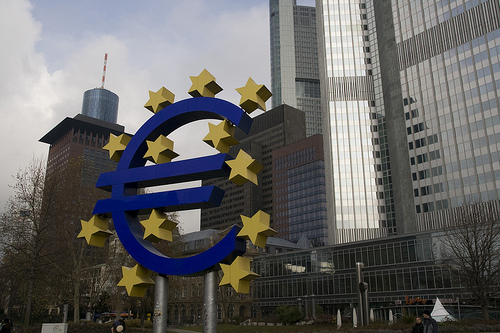The Euro Zone’s Inbuilt Flaw: Rising Rates Punishes the Weak
Please note that we are not authorised to provide any investment advice. The content on this page is for information purposes only.
Fastest Euro Zone Price Rise in 3 Years
Credit: jurjen_nl
20 April 2011.
Fastest Euro Zone Price Rise in 3 Years
Credit: jurjen_nl
20 April 2011.
Are all nations in the European Union created equal? The European Central Bank seems to think so. And is hiking interest rates by a quarter of a percent signaling a “return to normal standards,” according to Ewald Nowotny, member of the ECB Governing Council and governor of the Austrian National Bank. The ECB raised interest rates this month for the first time since July 2008.
Policymaker Nout Wellink said the bank neded to remain “very alert” on inflation dangers to avoid falling behind the curve. However ECB President Jean-Claude Trichet said he does not see alarming signs of second-round inflationary effects.
But for counties like Greece, Portugal and Ireland which are still coming out of the 2008 economic crisis, increasing the cost of borrowing will only worsen the economy. On the other hand, for countries like Germany whose economies are out of the slump and travelling smoothly, increased interest rates will improve the economy by slowing inflation – a current concern.
Official euro zone data showed inflation rose to 2.7 percent in March – above the 2 percent target ceiling.
In April 2011, the euro zone price rise was the fastest in 3 years. Euro zone growth in the service sector slowed, however factories ramped up their production as prices rose. Markit’s April Purchasing Managers Indexes also showed business activity in Germany and France outpaced the rest of euro zone – but problems continued in other countries.
The inherent problem with the euro zone idea is different countries need different monetary policies. A policy that is good for one country, is not good for the other. If not catastrophic.
In a report from Stratfor:
‘Nowotny indicated that the move was more symbolic than it was practical, although it did signal the ECB’s intention to start dealing with Europe’s rising inflation. Second, the Italian interior minister accused the French government of being “hostile” for not offering help as Rome deals with an influx of migrants fleeing chaos in Libya and post-revolutionary Tunisia.’
ECP Monetary Policy
The Euro bound Europe’s major economies by removing the ability to devalue other euro members. The common currency was also supposed to bring about convergence across economies. However the ongoing sovereign debt crisis contradicts the idea – and has forced Europeans to reinforce rules if they will actually converge over the next decade.
Raising the interest rates, won’t help the convergence either.
At first glance, raising interest rates to slow inflation in the euro zone seems an effective strategy for Germany for example. The rest of the region however is still coping drowning in debt and unemployment. On average, inflation in the euro zone is rising due to higher energy prices – costs that have cut into people’s income and reflected in operating balance sheets.
However these countries are already showing signs of deflationary trends. The argument that remains: is a one-size-fits-all monetary policy beneficial to euro zone’s most troubled economies?
Higher interest rates are set to impact households and mortgages tied to ECB’s policy rate. And in the current environment, the interest rate hike will really, cripple the rest of Europe (except Germany).
The Euro zone
One important factor that catalyzes convergence is the free movement of labor from high unemployment areas to areas of low unemployment and high opportunity. The most effective currency unions allow and encourage a free labor movement such as the US.
However unlike the US, Europe faces much greater obstacles. Like Stratfor illustrated:
‘it is far more difficult for a resident of Galicia, where unemployment is more than 20 percent due to a collapse of the construction industry, to hitch a trailer to his car and move to Baden-Wuerttemberg, where unemployment is around 4 percent. There are also cultural and linguistic barriers unlike anything Americans face, although the Europeans have at least removed administrative barriers to cross-country employment and have removed borders between the states, as any visitor or resident of Europe can attest to. These may not encourage perfect labor mobility, but they are important symbolic and technical steps toward an eventual convergence.’
Europe’s tab for Libyan unrest and Tunisia revolution
Italy’s shores are flooded with 20,000 migrants and Italy wants its EU neighbors to pick up the slack and take in some migrants; any takers on Muslim migrants anyone?
Certainly not France.
‘In response, Italy has decided to issue the migrants temporary resident permits so that they can cross Europe’s unregulated borders. It is Rome’s way of forcing its neighbors to pick up the slack. The French countered with its Interior Ministry ordering border officials to make sure that migrants from third countries crossing its borders are checked for a number of conditions, in addition to the possession of residence permits, before being allowed entry. However, there are no such border officials on the Franco-Italian border. Therefore, either France intends to restaff vacated border posts and impose checks on all travelers, or Paris is bluffing.’
The lack of support for open European borders is clear. To France: A temporary permanent residency is not sufficient for third nationals to set up in another EU member state. Italy says: Why should it shoulder the majority of negative effects of the North African fiasco merely because of geography, especially when Paris has been so vociferous about intervening in Libya and escalating EU member state involvement in the crisis?
Both are legally and principally correct, but all just to show how superficial the idea of an integrated Europe really is.
And Germany?
Well, the German-dominated ECB is pursuing a German-dominated monetary policy. France has no sympathy for its neighbor. At the first sign of crisis, national interests overcome post-national aspirations.
Liz Zuliani
EconomyWatch





